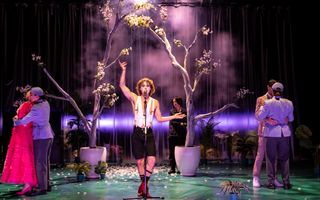Love
Love, in all its forms, is the theme at the centre of Twelfth Night – requited and unrequited, romantic and familial, expressed and repressed.
Familial Love
Familial love, in particular the love of siblings for one other, is explored as a special bond. At the top of the play, we hear about the sibling relationship of Olivia and her unnamed brother, recently deceased. Olivia decides to spend “seven years’ heat” out of sight mourning for him and “…like a cloistress she will veilèd walk, / And water once a day her chamber round / With eye-offending brine…” (Act 1, Scene 1)
The separation of Viola and Sebastian in the shipwreck is deeply upsetting to them both. Viola pleads for Sebastian’s safety, “Perchance he is not drowned.” (Act 1, Scene 2) and later, rejoices at his possible escape, “O, if it prove, / Tempests are kind, and salt waves fresh in love.” (Act 3, Scene 4) Sebastian too mourns the twin he believes “drowned already…with salt water” by seeming to “drown her remembrance again with more.” (Act 2, Scene 1)
While this bond between siblings is illustrated as being of crucial importance, it appears in both cases to be quickly superseded by the spark of romantic love.
Mercurial love – romantic love
That romantic love is mercurial is one of the first things we learn in this play. Love can arrive with lightning speed and then change, or even disappear, just as quickly. Orsino opens the play with this observation of love:
O spirit of love, how quick and fresh art thou,
That, notwithstanding thy capacity
Receiveth as the sea, naught enters there,
Of what validity and pitch soe’er,
But falls into abatement and low price
Even in a minute. So full of shapes is fancy
That it alone is high fantastical.
Orsino, Act 1, Scene 1
The romantic love in Twelfth Night is portrayed as being all encompassing, completely distracting and oftentimes self-delusional. Despite Olivia’s earlier commitment to remaining in mourning for her brother, love has different plans for her as the mysterious Cesario arrives on the scene. After meeting Cesario in Act 1, Scene 5, Olivia cautions herself, “Not too fast! Soft, soft - / Even so quickly may one catch the plague?” as she realises that “this youth’s perfections” have “crept in at mine eyes.” This lightning strike of lust or love shocks her and before she knows it, she’s sent after the young ‘man’, shocking even herself – “I do I know not what, and fear to find / Mine eye too great a flatterer for my mind.”
Orsino in turn is lovesick for Olivia and is “Unstaid and skittish in all motions else, / Save in the constant image of the creature / That is beloved.” He explains to Cesario, whom he assumes couldn’t possibly understand, that “…such as I am, all true lovers are.” (Act 2, scene 4) Of course, as dramatic irony would have, the audience already know that Viola-as-Cesario has in fact fallen quickly in love with him. The sharp heartache for her brother replaced by another heartfelt sensation – the love of her master, “Yet, a barful strife! / Whoe’er I woo, myself would be his wife.” (Act 1, Scene 4).
Shakespeare grapples with the difficulty of unrequited love through these and other characters in the play. For Duke Orsino the idea of unrequired love is an impossibility. Cesario, referring to Olivia, asks Orsino, “But if she cannot love you, sir?”, to which Orsino answers “It cannot be so answered.” (Act 2, Scene 4). Despite having little patience for Orsino’s unrelenting love for her, Olivia too finds she must express her love for Cesario despite ‘his’ opposition – “I love thee so that, maugre all thy pride, / Nor wit nor reason can my passion hide.” (Act 3, Scene 1) She hopes that by seeing more of each other “…thou perhaps mayst move / That heart, which now abhors, to like his love.” (Act 3, Scene 1) For both characters it seems that, in love, hope springs eternal.
For Viola, her unrequited love for Orsino proves a mournful experience of strangled joy. In Act 2, Scene 4 we may detect a certain enjoyment in her pain. Viola speaks to her master of an imaginary sister, a proxy of herself, who “…let concealment, like a worm I’the bud, / Feed on her damask cheek.” From this we learn that even in hopelessness love and longing can be just as passionate as the love that is returned.
Love in Twelfth Night is not restricted to the convention of heterosexuality. Antonio, the sea captain who rescued Sebastian “From the rude sea’s enraged and foamy mouth” (Act 5, Scene 1), risks his own safety for the young man he adores. Having already risked his life to save him, he then tempts fate again, “But come what may”, and enters Illyria despite fears for his own safety – “I do adore thee so / That danger shall seem sport, and I will go.” (Act 2, Scene 1) In the next scene Antonio gives Sebastian his purse purely in case, “your eye shall light upon some toy / You have desire to purchase” (Act 3, Scene 3). Later, when Antonio believes Sebastian to have forsaken him, it’s a betrayal that cuts deep:
His life I gave him, and did thereto add
My love without retention or restraint,
All his in dedication. For his sake
Did I expose myself – pure for his love –
Into the danger of this adverse town;
Drew to defend him when he was beset;
Where, being apprehended, his false cunning –
Not meaning to partake with me in danger –
Taught him to face me out of his acquaintance,
And grew a twenty years’ removed thing
While one would wink…
Antonio, Act 5, Scene 1
In the relationship between Olivia and Viola-as-Cesario, Shakespeare uses the convention of disguise to further his examination of unconventional homoerotic love. When Olivia first meets Cesario she’s introduced to ‘him’ by Malvolio as one, “Not yet old enough for a man, nor young enough for a boy” who speaks “very shrewishly” like a woman. (Act 1, Scene 5) Thus the audience see love blossom between the countess Olivia and a feminine ‘man’.
Self-love
Love of self is another topic explored and ridiculed in Twelfth Night, through the character Malvolio. He is chastised for being haughty and overparticular by everyone in Olivia’s household, even by his mistress herself: “O, you are sick of self-love, Malvolio, and taste with a distempered appetite.” (Act 1, Scene 5).
Fate, Fortune, and the Stars
Twelfth Night posits that the things that happen to humankind are outside of our control, that it may be fate, fortune and the stars that control events and manipulate human behaviour. In Act 1, Scene 2 of the play, Viola and the Captain introduce this idea as they discuss their fortune in managing to evade death, but fear for Viola’s twin brother Sebastian:
Viola:
My brother, he is in Elysium.
Perchance he is not drowned. What think you, sailors?
Captain:
It is perchance that you yourself were saved.
Viola:
O, my poor brother! and so perchance may he be.
Act 1, Scene 2
This deference to a mightier power is also seen in the way the play deals with love – that other central theme of this play – and one which pushes and pulls the characters along, without their consent, to their joy and their pain. Once Viola, disguised as Cesario, is in Duke Orsino’s employ, he sends her to woo Olivia for him – “I know thy constellation is right apt / For this affair.” (Act 1, Scene 4), meaning Viola’s character, as determined by the stars, will suit this mission.
After meeting Cesario for the first time, Olivia unwittingly falls for this unusual and feminine character. Feeling this attraction for Cesario she posits: “Fate, show thy force; ourselves we do not owe. / What is decreed must be, and be this so.” (Act 1, Scene 5)
Upon realising Olivia’s infatuation with her, Viola/Cesario entreats fate to help her out of this soon to be difficult love triangle; “O time, thou must untangle this, not I / It is too hard a knot for me to untie.” (Act 2, Scene 2). This deference to the stars is perhaps the way in which the characters in Twelfth Night absolve themselves of responsibility. Here Viola washes her hands of the responsibility of the destruction her disguise has caused, justifying it as beyond her control. The knot, untangled and needing to be untied, is an allusion to the Three Fates of ancient Greek mythology and their thread of inevitability.
Whilst some characters in Twelfth Night use the idea of fate and fortunate to defer their problems, Malvolio spends most of his time in idealistic hope of it. He says that “’Tis but fortune, all is fortune” (Act 2, Scene 5), hoping that Olivia will one day realise her affections for him. Once he’s been duped into believing that this has in fact come to pass, he’s quick to “…thank my stars, I am happy”, adding soon after “Jove, I thank thee!” (Act 2, Scene 5).
All that to say, this jurisdiction of the stars in Twelfth Night extends beyond the metaphysical, and reveals itself in the minutia of the everyday. Sir Toby teases Sir Andrew, “I did think by the excellent constitution of thy leg it was formed under the star of a galliard” (Act 1, Scene 3), and in defense of their love of revelry says, “What shall we do else? Were we not born under Taurus?” (Act 2, Scene 3) It was thought that each constellation governed a part of the body, Taurus being the legs and thighs, and thus their aptitude for dance.
Disguise, Duality, Deception
Twelfth Night is littered with allusions to, and images of, duality. There’s the obvious disguise of Viola as Cesario. The fact that she is a twin disguising herself as a man – her twin, Sebastian – is a double duality. Viola remains remarkably unknown to her audience. Although she’s the play’s central protagonist, we come to learn about her through what she conceals, as opposed to what she reveals: “What I am and what I would are as secret as maidenhead…” (Act 1, Scene 5) Because she spends much of the play disguised, the audience is also denied the opportunity to learn about her from what other characters say about her. All the audience really know of her is, “I am not that I play…” (Act 1, Scene 5).
Her disguise and its deception begin to cause problems for her, as when it attracts the adoration of Olivia:
I am the man! If it be so – as ‘tis –
Poor lady, she were better love a dream.
Disguise, I see thou art a wickedness
Wherein the pregnant enemy does much.
Act 2, Scene 2
Olivia is the antidote to this. While she begins the play masked by her veil, she quickly unveils herself and liberally expresses her opinions and desires, especially where love is concerned. In her first meeting with the disguised Viola, Olivia is quickly moved to reveal her covered face, and uses the allusion of painting, as if she’s revealing a recent portrait of herself. Viola remarks that the painting has been “Excellently done – if God did all”, to which Olivia responds, “’Tis in grain, sir, ‘twill endure wind and weather.” (Act 1, Scene 5). Olivia is telling this stranger and the audience that she is who she appears to be. She uses no barrier, not even makeup.
Viola, taken to be her twin Sebastian, is berated by Antonio for not coming to his aid and told, “Thou has, Sebastian, done good feature shame.” (Act 3, Scene 4) We’re shown here the dangers of mistaken identity. Antonio goes onto say that what people look like is less important than how they behave:
In nature, there’s no blemish but the mind;
None can be called deformed, but he unkind.
Virtue is beauty; but the beauteous evil
Are empty trunks o’er-flourished by the devil.
Act 3, Scene 4
As an audience we are treated to the dramatic irony of the situation. While Antonio is sermonising the importance of people’s implicit goodness over their appearance, we know that appearance and correct identification is crucially important in being able to judge people’s behaviour correctly.
The deception is soon revealed as being a case of mistaken identity and the two halves of one whole are brought back together – “One face, one voice, one habit, and two persons! A natural perspective, that is and is not.” (Orsino, Act 5, Scene 1)
Trickery
Bid the dishonest man mend himself: if he mend, he is no longer dishonest; if he cannot, let the botcher mend him. Anything that’s mended, is but patched: virtue that transgresses is but patched with sin; and sin that amends is but patched with virtue.
Feste, Act 1, Scene 5
Fooling, clowning and trickery are consistent themes throughout Twelfth Night. The title itself names a celebration, falling on the 5th of January, which was a night in which the world was topsy turvy, when ordinary societal rules did not apply.
Running parallel to the love plot of Viola, Olivia, Orsino and Sebastian, is the plot of trickery against Malvolio. This subplot is just as important, and in many productions can steal the show. The plot against Malvolio begins in Act 2, Scene 3, after Malvolio has chastised Sir Toby and his cohort because they “gabble like tinkers” late into the night and “make an alehouse of my lady’s house”. Sir Toby goads Malvolio asking, “Dost thou think, because thou art virtuous, there shall be no more cakes and ale?”, and the fooling begins. Olivia’s gentlewoman, Maria, writes a letter in her mistress’ hand, alluding to the love she bears Malvolio, and leaves it where he might happen upon it. This “Sport royal”, as Maria refers to it, causes the puritanical Malvolio to dress ridiculously in “yellow stockings and cross-gartered” (Act 2, Scene 5); flirt with his mistress, who deems his behaviour “very midsummer madness” (Act 3, Scene 4); and ultimately end up locked in a “dark room” (Act 3, Scene 4) which was a known treatment for insanity at the time.
Fooling and trickery are the catalysts to many problems, but they also create unexpected pleasures. The disguise of Viola as Cesario and the many instances of mistaken identity that result, are manifestations of trickery and deceit. In Act 4, Scene 3, Sebastian marvels at the situation that has unfolded with Olivia who, unbeknownst to him, thinks he is his sister:
For though my soul disputes well with my sense
That this may be some error, but no madness,
Yet doth this accident and flood of fortune
So far exceed all instance, all discourse,
That I am ready to distrust mine eyes,
And wrangle with my reason that persuades me
To any other trust but that I am mad –
Or else the lady’s mad…
There’s something in’t that is deceivable.
Act 4, Scene 3
Furthermore, it isn’t just this fooling and trickery that gets people into trouble in Illyria, it is also misinterpretation. Feste, Olivia’s jester and self-proclaimed “corrupter of words” (Act 3, Scene 1), provides much commentary on how we are vulnerable to misconstrue meanings: “To see this age! A sentence is but a cheveril glove to a good wit; how quickly the wrong side may be turned outward.” (Act 3, Scene 1).
To Feste, not only have words become pliable to be misconstrued, but they’ve become false at their core. Engaging in wordplay with Viola, Feste proclaims, “Troth sir, I can yield you none without words, and words are grown so false, I am loath to prove reason with them.” (Act 3, Scene 1) Even as he bemoans their lack of value Feste is the ultimate wordsmith, harnessing their power.





